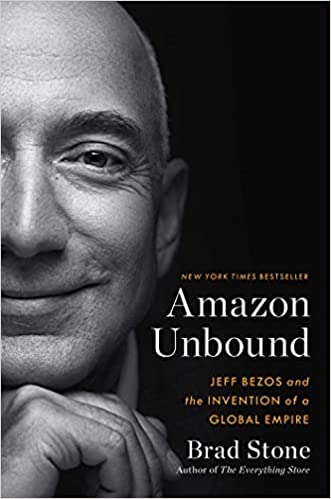You have /5 articles left.
Sign up for a free account or log in.
 Amazon Unbound: Jeff Bezos and the Invention of a Global Empire by Brad Stone
Amazon Unbound: Jeff Bezos and the Invention of a Global Empire by Brad Stone
Published in May 2021
This is how I read Amazon Unbound:
- Purchased ebook on Amazon.com using an Amazon Prime credit card.
- Purchased the audiobook on Audible.com, a company owned by Amazon, using credits purchased with the Amazon credit card.
- Read the ebook on a Kindle Oasis, the e-reader device made by Amazon.
- Listened to the audiobook on an iPhone, using Amazon’s Kindle app.
Amazon Unbound is all about the consequences of a single company dominating the supply (monopsony) or the demand (monopoly) of a good or service.
Amazon argues that when it comes to retail, the company is neither. While Amazon’s share of the e-commerce market is around 50 percent, Amazon’s total share of all retail sales (at least pre-pandemic) was only about 6 percent.
However, it is difficult to argue that there is much meaningful competition when it comes to digital books.
Books are what I care about most. But books are not the focus of Amazon Unbound.
Amazon Unbound picks up where Stone’s 2014 book, The Everything Store, leaves off.
This is Amazon during the years of astounding logistics infrastructure growth (fulfillment centers, planes and last-mile delivery), the birth of the Alexa virtual assistant, and the extraordinary rise in the company’s market capitalization.
Amazon is now worth an astounding $1.8 trillion, up from $140 billion in 2014.
The years covered in Amazon Unbound are also the years when Jeff Bezos became the richest man in the world, purchased The Washington Post and accelerated his efforts to launch himself into space.
Anyone paying attention to the Amazon story will feel guilty for our dependence on the company. All of us (and there are some 147 million Prime subscribers in the U.S.) are complicit.
As Stone describes in detail, Amazon’s most essential shortcoming is the deplorable way that the company treats its hourly employees.
Amazon’s philosophy, which originates in Bezos’s worldview, is that workers are mostly a bug in the system.
Amazon does little to promote its warehouse workers to management or other higher-paying positions. The attrition rate at Amazon is so high that the company must replace the equivalent of its hourly workforce each year. Amazon is now the second-largest U.S.-based global employer in the world, with a workforce of 1.3 million. (Walmart employs about 2.2 million).
Fast delivery of low-priced online goods is built on the backs of a mostly low-paid and short-serving workforce.
For a company that earned over $20 billion in profits in 2020 and whose founder is now worth over $210 billion, you’d think that Amazon could afford to treat its workers well enough to make them want to stay.
The problem is that knowing about the dark side of Amazon will not necessarily translate into personal changes. I know that it has not been for me.
The story that Stone tells in Amazon Unbound is deeply disturbing. But I really hate going to physical stores. (Even before COVID.)
And I love reading books on Amazon’s digital platforms.
The paradox of Amazon’s digital book monopoly is that it is really good for some readers (like me) but likely ultimately damaging for the future of book culture.
My ability to read the ebook and audiobook versions of Amazon Unbound was premised on my ability to pay $14.99 for the Kindle version and $9.56 for the Audible version. Plus, I had to own a Kindle e-reader and a phone to listen to the audiobook.
Since I purchased the digital books from Amazon, I was not dependent on my local bookstore or public library for physical copies. Those are book-buying dollars not spent at a physical bookstore and patronage not exercised at a public library.
With little to no competition in digital books, Amazon will be free in the future to raise prices.
It seems that the people of higher ed should be more worried about concentrated ownership of the platforms that enable the dissemination of the ideas found in books.
We should be having a campus conversation about the meaning of Amazon.
The good news is that reading Amazon Unbound would be a great way to motivate and inform that conversation.
The bad news is that most of us would probably get the book from Amazon and read/listen to the digital version on Amazon devices.
What are you reading?




